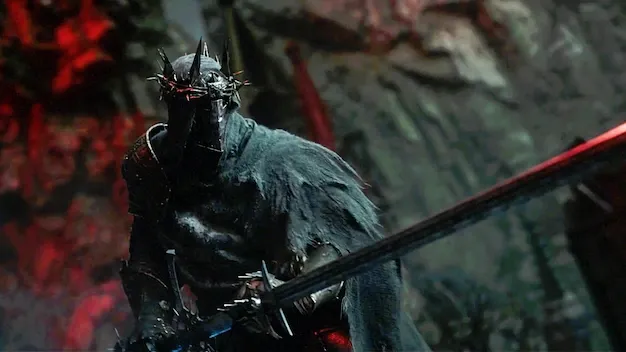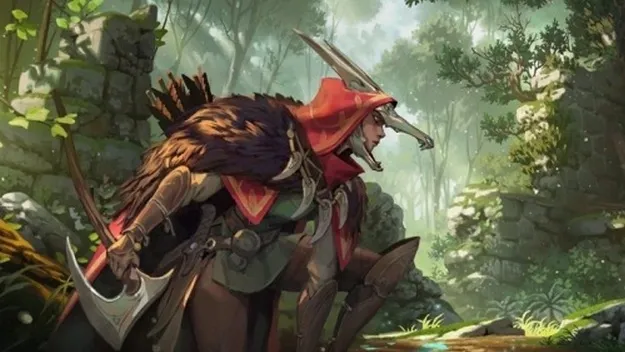Sifu - Review
Sifu is a kung fu game by the French studio Slowclap that in 2017 brought us a solid martial arts title called Absolver. It is a title that has seemed interesting since the first shows, but in time it became one of the most anticipated scams of the year.
We are promised a game of spectacular combat choreography and an interesting concept of the protagonist who grows old with each death and then becomes stronger. What they didn't tell us is that by playing we will also get a simulation of reliving the worst traumas.
For the beat ’em up genre, fun and satisfying sense of struggle is of immense importance. I will immediately say, briefly and clearly, that Sifu is one of the best martial arts experiences I have ever had in virtual form. There are countless different punches in the game, and some will surely be delighted that one of them is the legendary one-inch punch popularized by Bruce Lee.
What is fantastic about Sifu is the fact that great attention is paid to each stroke. Not only do the strokes seem quite convincing, but they also have a concrete weight, which creates a feeling of immense satisfaction in the player every time he slaps someone. The animations of the combined strokes and finishers are also brilliantly executed, so you never notice those seams that work artificially and break the tempo of the game.
These animations are extremely fluid, so they will work just as well when your opponent is facing a slightly different angle or you are a little further away from him. On the other hand, you activate attractive finishers at the touch of a button, but only after bringing your opponent to a low level of health.
An important role in the fight is played by the environment which does not
serve as a backdrop but is a strategic element whose importance the player
should become aware of as soon as possible. You can throw opponents from the
heights, push one on top of the other, shoot objects around you, drive into
walls, tear down shelves with them, but also beat them with beer bottles or a
good old pacer.
You also have vault mechanics at your disposal with
which you can skip tables or benches to temporarily move away from the enemy
horde and get a moment of needed respite. To overcome the opponent, you will
also use special focus shots that cause a large amount of damage, and when
activated, time is slowed down.
Focus shots are only possible after
the focus bar is filled, which is always visible in the lower-left corner.
Fortunately for you, fill it up easily - by beating up enemies.
For some reason, your opponents have never watched Steven Seagal's movies, so
they don't attack you one by one with pre-arranged punches, but attack in a
pack and beat you wherever you go. Seriously, opponents in Sifu are no joke
and in some parts, you’ll have to stop the game to wipe your gamepad or mouse
out of sweat.
You fight enemies by hitting them with light and
heavy blows while simultaneously dodging, parrying, and blocking. A system has
been implemented in the blockade that will be very familiar to masochists who
played the excellent Sekiro: Shadows Die Twice.
In short, you can’t
just reduce the entire defense to lazily blocking and waiting for the attack
to end because your block can be breached, and then you’re in trouble. In this
way, the game forces you to use other defensive options.
This combination of defensive and offensive options is necessary to survive
numerous, and diverse enemies. You will slap hooligans, bums, junkies,
smashers, but also more serious opponents such as those who hold weapons in
their hands, martial arts masters, grapplers, and well-built gorillas.
They
are all equally aggressive and will constantly force you to adapt to them.
Sifu requires a lot from the player, but the same amount will be returned to
you in return. The moment you understand the way the game wants you to play
it, the real art of violence begins, in which you can clear dozens of enemies
in one comb, without taking a smile off your face for a moment.
You
had a similar sense of power when playing the Batman Arkham series or in the
not-so-distant Miles Morales, but Sifu takes that pleasure to a new level.
Dying in the game
Sifu is ruthless and comes to terms with the fact that you will die.
Many times. What I particularly liked was how the death of your character is
related to the mechanics of gameplay.
Namely, every time you
exhale, your death is not permanent, but because of the magical talisman, you
immediately come back to life, only the elderly. In the beginning, you are
only one year old, and as you start the game in your twenties, it won't seem
so scary, but if you continue to die...
For each death, you get one point on your death counter. How old you get depends primarily on the number of deaths in certain parts of the game. The more often you die on the same stocks, and against the same opponents, the more your death counter will increase, while you can reduce it by crossing the problematic stock or buying in shrines.
The element of aging here is not just cosmetic. As you get older, you become
an increasingly experienced fighter, so your attacks do more damage.
Logically, due to age, your body is becoming more fragile, so you have less
and less health. I have to admit that I haven’t seen such a good and tense
high-risk concept for a grand prize in a long time.
As a
grandparent, you beat everyone around you, and just when you start thinking
you have become an Ip Man, someone hits you twice, and you fall. The talisman
that brings you back to life is made up of five elements important in Chinese
culture (earth, water, fire, wood, metal), and for every ten years spent, one
link disappears, so the game has a classic game over that is activated when
you reach a certain age.
Revenge
Sifu is a game that has an extremely simple plot, and you shouldn't be
hasty and take it as a critique. The story begins one night when a young
student hidden in a closet witness the murder of a family member and teacher
by five strangers.
Filled with sadness, anger, and determination,
the child quickly grows into an adult (the game allows you to choose between a
man and a woman) eager for revenge and goes hunting for the people responsible
for his father's death.
The way Sifu approaches revenge is irresistibly reminiscent of some fantastic
films with the same theme. If you are a fan of Korean classics such as Oldboy
or I Saw the Devil or American versions such as Kill Bill or John Wick, Sifu
will enchant you with its atmosphere. There is a part of the game that is a
direct love letter to one of the mentioned movies, but I would like you to
discover it for yourself, so I won't spoil anything for you.
At the
beginning of the game, you know nothing about the people who need to be
killed, but over time you collect clues that you put together as a whole on
your detective board that serves as a kind of reminder to all intel about
enemies, locations, and the like.
Viewed visually, Sifu is a game of beautiful cartoon graphics that looks as if it is painted with solid movements with a mixture of watercolors and oils on canvas. The colors are quite pronounced, and techniques of high contrast and neon reflection are often used. The sound side of the game is also masterfully done.
The game combines traditional Chinese and modern house music in the best
possible way. Combining flute, and warrior drums with, for example, dubstep
results in a soundtrack that constantly raises your adrenaline and keeps you
tense.
If you’ve got the impression that the game is a purely
linear trajectory, you might be surprised by the fact that Sifu has as many as
three different endings. Each carries a well-thought-out semantic message and
will make the player think about the deeper issue of revenge and the
consequences it brings with it.
Two endings concern your play and round out the player’s journey, while one leaves the end completely open and announces a potential sequel that is sure to follow us, at least in DLC form. The Paris studio that brought us the game recently announced additional single-player content.
Fights
Sifu is made up of an introductory prologue and five levels at the end
of which one of the five main villains awaits you. You fight in pubs, factory
halls, dead ends, fancy clubs, martial arts schools, corridors of abandoned
buildings… The arenas are diverse, and each exudes its atmosphere and type of
opponent, so you are never bored.
Sifu has certain levels of
research because the levels in which you move are not plotted as a direction,
but branch out. The research will be important primarily because of finding
sanctuaries that serve to upgrade your character, which sometimes does more
revenge than it helps.
The main thing is that upgrades aren't
permanent at first - you lose them once you die. We found that Sifu is a damn
hard game, so you can conclude for yourself that the charging experience is
not the most fun thing in the world, which further complicates the upgrade
system.
The icing on the cake is a game limit when you can buy
certain improvements, ie some things are only available to you in a certain
range of years. All in all, the upgrade system didn’t sit well with me, and I
feel like it’s unnecessarily complex.
Another reason why it pays to
research levels is to discover different shortcuts. The game allows you to
skip some sections of the fight completely by unlocking the shortcuts that are
on each level.
Unlocking shortcuts will greatly help you in
switching the game because with their help you can avoid some really hard and
awkward conflicts. Of course, you do all this to get as healthy and young as
you can, because that leaves you more room for mistakes and inevitable
deaths.
Sifu is a game that is quite difficult to determine the
length. There are videos of maniacs on the internet showing that Sifu can be
crossed from the first attempt in a shocking 45 minutes, but rest assured that
this will not be the case with most. My socializing with the game lasted about
11 hours and take that as a rough average.
Of course, if you want
to unlock all three endings and learn all the cakes and tricks the game has to
offer, you can easily multiply that number by two and add a little more.
Although the game thrilled me, I’m not sure how many more times I would love
to play it. There were moments when, after dying, I left the game angry and
frustrated and walked away from my monitor without a word, my moods
irretrievably lost.
I think it should be clear to everyone that
this is not a game for everyone, but it is important to emphasize that Sifu is
not for the average video game fan either. Sifu is the type of game that will
try to get you to give up practically in the opening scene and the title that
will severely punish any of your mental absence and lack of thinking.
If
that didn’t discourage you, it means you’re aware of what you’re getting into,
and you’ve decided to give the game a chance. In that case, you will play a
fantastic and atmospheric beat ’em up title after which you will feel pride,
fulfillment, and a desire to introduce martial arts into your life.
- an innovative concept of aging the main character
- a fantastic sense of struggle and beautiful animation
- excellent interaction with the environment
- difficult and challenge, if you enjoy it
- the upgrade system is not of much use
- the repetitive structure of the game can cause frustration
- difficult and challenging, if you don’t enjoy it

















